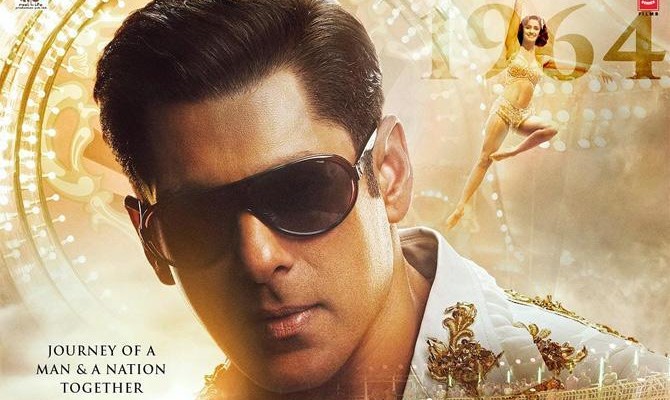Bharat is very much a full-on Salman Khan film, first and foremost, with all Bollywood mania mixed into it
Bharat
U/A: Action, Drama
Director: Ali Abbas Zafar
Cast: Salman Khan, Katrina Kaif, Sunil Grover, Disha Patani, Jackie Shroff
Ratings: 
This is what in India we call the “festival” film. It’s the opposite of what the rest of the world means by that (art-house) term.
Which explains the excitement over waking up early, for the opening day’s show, in a theatre that is half packed (a rarity), waiting for the picture to start, so we can collectively share seetis and thrills that’s brought us together over Eid, in the first place.
And because it is Bhai, or Salman Khan’s film, the expectations over quality has been traditionally lower anyway. For a couple of decades, more often than not, he’s managed to get away with his presence alone. Of course there are plenty of exceptions, where the superstar has participated in what qualifies as a film per se — rather than a ‘Salman film’, which is an entity of its own. His last Eid release, Race 3 (2018), was certainly the latter.
In that sense, one could argue that Bharat is probably closer to Salman’s 2015, much-loved Eid release, Bajrangi Bhaijaan, rather than Sultan (2016), the fine super-hit he delivered with Ali Abbas Zafar, who’s also directed this huge-budget event-pic.
I’m probably saying this because at some level, India and Pakistan — both united and divided by history — are almost as central to Bharat as to Bajrangi. Also, peacenik Salman, equally popular in both countries, plays off rather well with another fine actor, always by his side; in this case, Sunil Grover, as against Nawaz in Bajrangi. Even the hero’s unconditional love for a little child makes its way at some point.
That said, without doubt, this is the stiff Indian super-hero Sal-man’s most ambitious film, ever — not just in terms of the stupendous scale, sweep, but also scope, as the story spans over a time period of 63 years. All of it remarkably packed into 165 minutes, between multiple locations, even as the eponymous protagonist remains the ‘hatta katta’ dude, still talking about “haq, and halal (what’s right, and permissible).”
Salman plays Bharat, of course. But he’s at the root the Everyman, with a story that rivals legends, although you wouldn’t know it, unless he sat you down and told you so. This is true for so many old folk. The film is an official remake of one of South Korea’s top grossers, Yoon Je-kyoon’s Ode To My Father (2014).
Like the Korean original, it follows the contemporary history of a nation while mirroring the memoirs of a man, traversing momentous flips and turns over decades. Haven’t seen Je-Kyoon’s Ode To My Father, although I’m now tempted to. This Indianised version though starts with the 1947 Partition. To give you a sense of how deep that wound is, suffice it to know that it took 26 years for Bollywood to first address that subject head-on, with MS Sathyu’s Garm Hawa (1973).
This, while a sizeable portion of the city’s film industry itself comprises post-Partition refugees, who migrated to a new land, built homes, found jobs, raised families and finances, absolutely starting from
As does little boy Bharat, chancing upon careers that you might even find implausible — going through life’s long passages that you might consider fantastical, or way too filmy (and therefore slightly laborious to watch, on occasion).
But through it all, the character displays tremendous grit and enterprise, much like that admirable, post-independence generation — surely on both sides of the border. Along the way, he also finds unqualified romance in a posh, progressive woman (Katrina Kaif; sassiest since Zindagi Na Milegi Dobara). She’s a feminist icon of sorts. So is the guy, by the way.
As a literary type/genre, you would consider this script full of synchronicity, wherein the story of an extraordinary life totally fuses with something much larger — coincidences being deliberate. Think Salman Rushdie’s Midnight’s Children, right from its opening para: “I was born in Doctor Narlikar’s Nursing Home on August 15th, 1947. The time matters, too.”
But for the time being, screw synchronicity. Make no mistake. This is very much a full-on Salman film, first and foremost, with all Bollywood mania mixed into it — for better or worse; depending on whether you’re a die-hard fan, or not.
Frankly, think both sets will be reasonably pleased, and for all you know, Bharat might even hold high-potential for a National Award in that consolatory “wholesome entertainment” category. Certainly that’s not what I was expecting, walking in simply to celebrate Eid by the way!


Leave a Reply